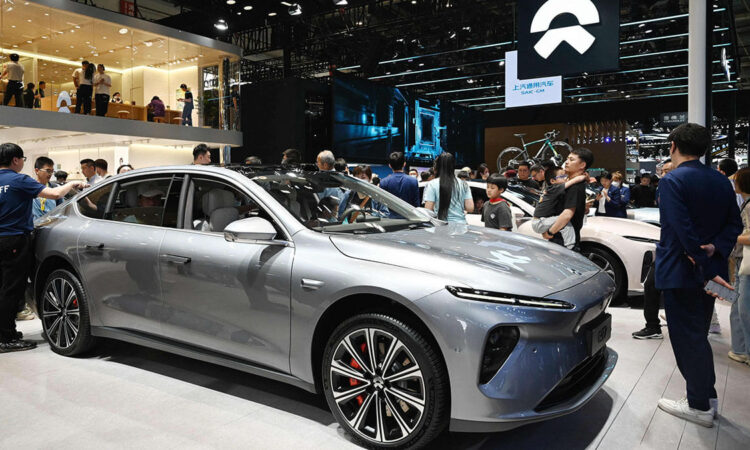
The European Union on Thursday announced the provisional adoption of additional countervailing duties of up to 38% on Chinese electric vehicle manufacturers, saying they benefit from “unfair” subsidies.
These subsidies represent a “threat of economic injury to European producers”, the European Commission, the EU’s executive arm, said in a statement.
The new tariffs will apply from 5 July.
The EU intends to adopt a final measure in November, but until then it will hold talks with China in search of a solution, although the Chinese authorities have already warned that they will apply retaliatory measures.
The Chinese Chamber of Commerce in the EU (CCCEU) denounced Thursday’s decision as a “protectionist measure”.
The body, which represents more than 1,000 Chinese companies in the EU, said it was “deeply disappointed and dissatisfied” with the decision announced on Thursday.
Chinese electric car company NIO, which produces high-end models, said in a note that it hopes the Asian giant and the EU “reach a solution” to the trade dispute.
Meanwhile, XPeng told AFP that it “will not change its strategy of exploring foreign markets” and that it hopes to find “ways to minimise the impact on consumers”.
In its statement, the European Commission pointed out that the adoption of these provisional and additional tariffs is the result of a nine-month investigation.
That investigation concluded that China’s electric car value chain “benefits from unfair subsidies, which is causing a threat of economic injury to EU producers”.
It therefore announced the provisional adoption of tariffs of 17.4% for BYD and 19.9% for Geely, as well as customs duties of 37.6% for SAIC.
Other electric car producers in China that cooperated in the investigation are subject to average tariffs of 20.8%, while for non-cooperating companies this amounts to 37.6%.
In May, the European Commission had already threatened to increase tariffs to 38%, on top of the current import duties of 10%.
Hope for dialogue
The move comes despite trade talks between China and the EU on 22 June.
According to EU Trade Commissioner Valdis Dombrovskis, the EU will continue to “work intensively with China on a mutually acceptable solution”.
“Any negotiated outcome of our investigation must clearly and fully address the EU’s concerns and respect World Trade Organisation rules,” the official said in a note.
Last month, China opened an investigation into pork imports, threatening Spanish exports.
Chinese officials have also criticised investigations targeting state subsidies in the green technology sector, including wind turbines and solar panels.
The EU is seeking to make electric vehicles more widespread, as the bloc will ban the sale of new cars powered by fossil fuel engines from 2035.
At the same time, it aims to protect its car industry.
However, Germany, an automotive powerhouse and a major trading partner of the Asian giant, fears that the high tariffs will generate retaliatory tariffs that will hit its activities in the Chinese market.
On Thursday, German car giant Volkswagen rejected the high tariffs announced by the EU as “harmful”.
“The negative effects of this decision outweigh the potential benefits for the European automotive industry and in particular for Germany,” the group said.
Electric vehicles from China account for almost 22% of the European market, up from 3% just three years ago, according to automotive industry estimates.






